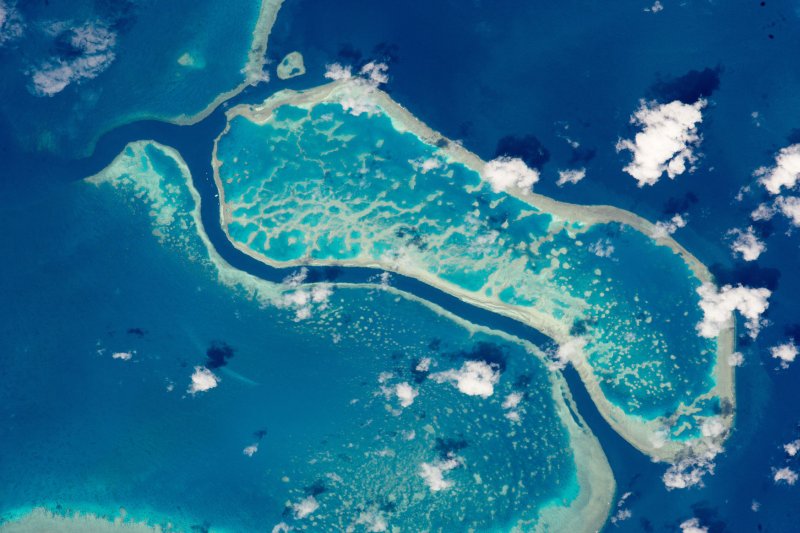
A study published Wednesday in the journal Nature said coastal wetlands and coral reefs are "hanging by a thread" as global warming raises sea levels. Pictured is Australia's great Barrier Reef as seen from space. Photo courtesy of NASA | License Photo
Aug. 30 (UPI) -- A study published Wednesday shows rising sea levels are endangering coastal wetland and coral reef ecosystems that are unlikely keep pace with the "drowning" effects of sea-level rise.
"Collectively, these are among the most valuable ecosystems on the planet. For example, the world's fisheries depend to a significant extent on the health of coastal wetlands and coral reefs," co-author Tulane University geology Professor Torbjörn Törnqvist said in a statement about the study in the journal Nature.
These coastal wetlands and coral reefs depend heavily on whether global warming can be contained to less than 3.6 degrees Fahrenheit (2 degrees Celsius), the study said.
"This shows the importance of the Paris Agreement that aims to keep warming within 2 °C and ideally 1.5 °C," Törnqvist said. "Clearly, this would make a huge difference for coastal ecosystems.
Read More
"However, right now we are on track for 2.4 to 3.5 °C of warming by the end of this century, so a change of course is desperately needed. And this would have to happen very quickly."
Researchers found that if warming is below that temperature these coastal ecosystems will likely survive by 2100, but if the temperature rise is greater than 3.6 degrees F, there "will likely be widespread collapse."
The study found that coastal marshes, mangroves and reef islands "are unlikely to keep pace with rates of sea-level rise that exceed about one quarter of an inch (7 millimeters) per year. This rate is likely to occur by 2100 in most parts of the world in the absence of major efforts to reduce greenhouse gas emissions."
Already, though, sea level rise higher than a quarter of an inch has been seen along the U.S. Gulf Coast.
Previous Tulane research has shown that the current rate rising sea levels could "drown" marshlands in Louisiana, and possibly other areas along the Gulf Coast, in about 50 years.
The study was done by an international team led by Neil Saintilan at Macquarie University, with researchers at other Australian universities, as well as co-authors from Singapore, Hong Kong, the United Kingdom and the United States.
Törnqvist focused primarily on developing new methods to determine wetland vulnerability to sea-level rise in the geologic past, with funds from the National Science Foundation.
No comments:
Post a Comment